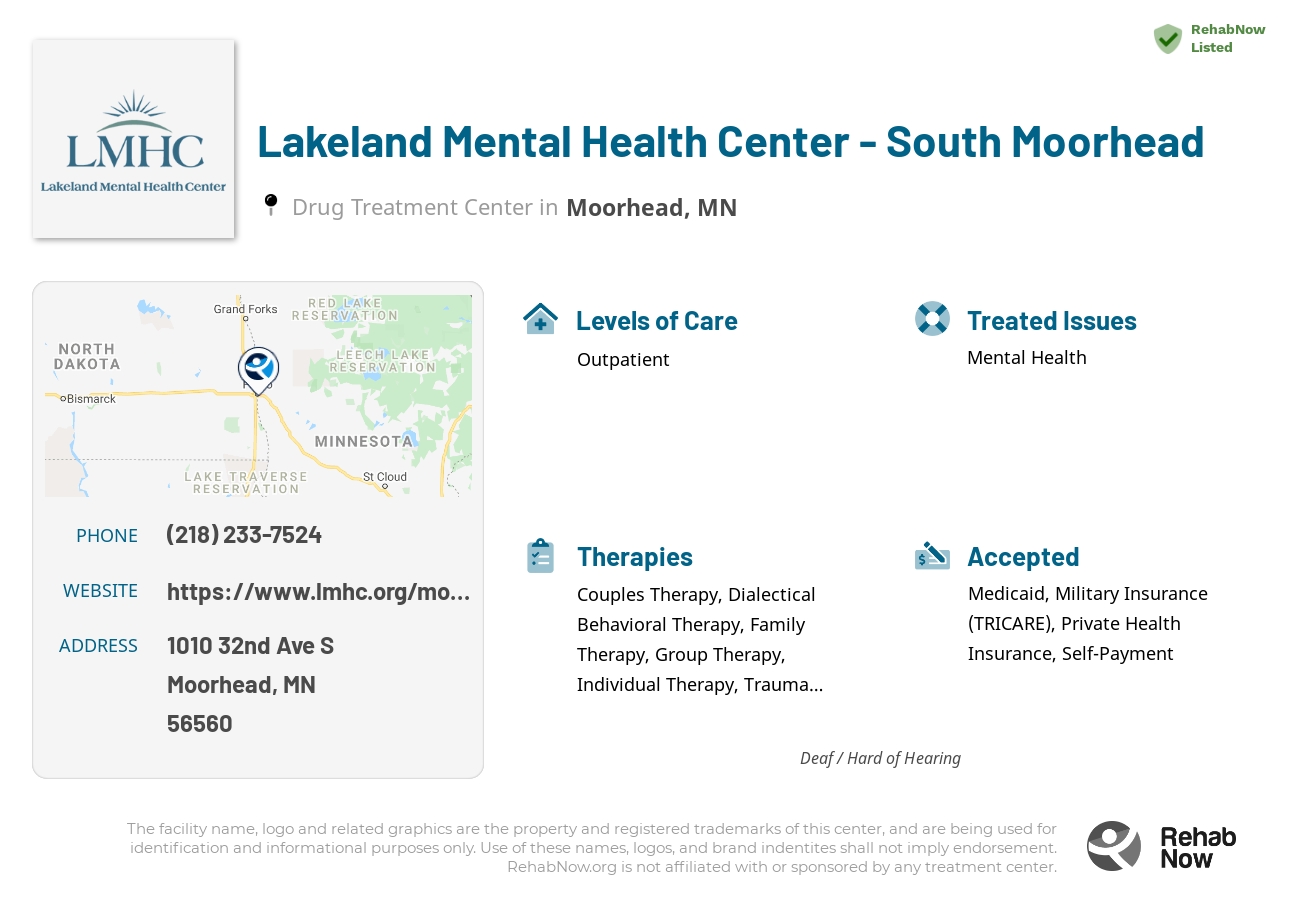Lakeland Mental Health Center - South Moorhead
Drug Rehab Center in Moorhead, Minnesota
Lakeland Mental Health Center - South Moorhead, founded in 1949, is an Addiction Treatment Facility in Moorhead, MN providing Mental Health disorder and Substance use treatment services, case management, substance abuse education, psychological testing and more with Private Health Insurance accepted and affiliated with the Lakeland Mental Health Center.
About Lakeland Mental Health Center - South Moorhead in Minnesota
Lakeland Mental Health Center - South Moorhead, a reputable addiction treatment facility in Moorhead, Minnesota, has been providing crucial services since its establishment in 1949. Recognized for its commitment to quality care, the center is accredited by the Commission on Accreditation of Rehabilitation Facilities (CARF). Offering outpatient, detox, and dual-diagnosis levels of care, Lakeland Mental Health Center - South Moorhead caters to individuals suffering from mental health issues, alcoholism, drug addiction, dual diagnoses, and substance abuse. Furthermore, the center accepts private health insurance, ensuring accessible and comprehensive treatment options for those in need.
Lakeland Mental Health Center - South Moorhead takes a holistic approach to addiction and substance abuse treatment, providing a range of diverse services to suit each individual's needs. The facility offers outpatient care, allowing individuals to receive support and treatment while maintaining their daily lives. Additionally, the center provides detox services to help individuals safely and comfortably withdraw from substances. Furthermore, Lakeland Mental Health Center - South Moorhead specializes in dual-diagnosis treatment, recognizing the complex relationship between mental health and addiction, addressing both aspects simultaneously. With their expertise in treating alcoholism, drug addiction, and substance abuse, the center offers a comprehensive and integrated approach to recovery, fostering long-lasting positive outcomes for their patients.
Genders
Ages
Modality
Additional
Accreditations

CARF
The Commission on Accreditation of Rehabilitation Facilities (CARF) is a non-profit organization that specifically accredits rehab organizations. Founded in 1966, CARF's, mission is to help service providers like rehab facilities maintain high standards of care.
Conditions and Issues Treated
Levels of Care Offered
This center offers a variety of custom treatment tailored to individual recovery. Currently available are Outpatient, with additional therapies available as listed below.
Outpatient treatment is considered the lower intensity level of addiction treatment. It’s ideal for early phase addiction or lower intensity addictions. It may include weekly sessions instead of daily. It may include weekly sessions instead of daily. Peer group support, 12-step programs, and individual counseling may still be involved but at a lesser frequency than an intensive outpatient program. It is a good choice for someone who doesn’t need to go through a medically supervised detox and who has a supportive home environment. It requires motivation and dedication to commit to the program without constant monitoring.
Therapies & Programs
Individual therapy involves one-on-one sessions between the patient and therapist. It provides patients with a safe environment to openly discuss personal and sensitive issues with the therapist. They find the therapist as someone they can trust. Individual therapy aims to identify the core issues that would have led the patient to substance abuse and address them effectively. The therapist can develop patient-specific customized solutions through individual therapy, which aids speedier recovery.
Couples therapy works with clients and significant others in a professional capacity to improve relationship dynamics. This can be helpful for addicts who are trying to marry the idea of recovery into their work, family, social lives – any aspect that has to do with relationships.
Through counseling sessions, addicts will have an opportunity to talk about their addiction with professional partners. These partners can offer feedback and advice on how to get sober while keeping healthy relationships intact. A good couples therapist will help addicts understand their part in an unhealthy relationship dynamic or find ways to deal with anger or resentment from significant others outside of the home.
Family therapy is a group problem-solving that aims to improve communication and relationships between the addict, their family, and sometimes friends. The main goal of family therapy for drug addiction is to create an environment where communication can occur without judgment, hostility, or blame. The therapist is with the family as they learn to communicate differently, especially with the addict when s/he is using. The family can learn to reduce their enabling behavior or rally together and support each other during tough times.
An addict’s family can play a vital part in helping them to avoid relapse because they can spot the warning signs and help them get back on track before it becomes too much of a problem. Family therapy is one of the most effective ways to help addicts stay on the path to long-term sobriety. When a drug addict decides that they want to try and get sober, it takes the support of every person they love to succeed. It can be incredibly difficult for loved ones to watch an addict go through the pain and suffering of withdrawal, but by being there with them and supporting them, they can help to make sure that the addiction never returns.
Groups typically involve meetings with other recovering addicts who can relate to one another’s experiences. They might meet in person or online and typically focus on the process of staying sober rather than overcoming a specific addiction.
In these groups managed by Lakeland Mental Health Center - South Moorhead, addicts can build a sense of community and develop strong emotional connections with others who understand what they are going through. These beneficial relationships can help addicts overcome their cravings and prevent relapse at any point during the recovery process.
In general, trauma therapy is a clinical process that helps individuals deal with mental stress often caused by traumatic events. The therapist helps the person identify, understand, and work through the problem. This is done with the help of talking about it in group or one-on-one counseling sessions. Therapists use relaxation, role-playing, art, and music to help the person open up about what is bothering them.
There are many different types of trauma therapists, such as psychiatric nurses and counselors. Not everyone is a good candidate for this type of therapy; it is generally reserved for people who have recently experienced a traumatic event and struggle to get over it. It is often done for children, teenage victims of sexual assault, and war veterans.
Dialectical Behavior Therapy (DBT) is a type of therapy created in the late 1980s and early 1990s to help people with high rates of suicidal behavior. DBT helps people learn how to live a life that is no longer controlled by overwhelming emotions and urges. It is beneficial in treating drug addiction because it helps patients understand and cope with their cravings for drugs or alcohol rather than turning to those substances as a way of coping.
There is hope for people who are addicted to drugs and alcohol. Cognitive Behavioral Therapy (CBT) is the solution. CBT focuses on the underlying thoughts and behaviors that caused the addiction problem in the first place and may cause a relapse. This type of psychotherapy addresses negative feelings common in substance abuse disorders. It helps to change them by restructuring thought patterns. It’s about removing negative thoughts and providing long-term benefits while promoting self-awareness, self-control, and healthy ways to respond to negative thoughts. These sessions can be done by themselves or as part of combination therapy.
Payment Options Accepted
For specific insurance or payment methods please contact us.
Is your insurance accepted?
Ask an expert, call (888) 674-0062
Lakeland Mental Health Center Associated Centers
Discover treatment facilities under the same provider.
- Lakeland Mental Health Center - Fergus Falls in Fergus Falls, MN
- Lakeland Mental Health Center - Detroit Lakes in Detroit Lakes, MN
- Lakeland Mental Health Center - Alexandria in Alexandria, MN
Learn More About Lakeland Mental Health Center Centers
Additional Details
Specifics, location, and helpful extra information.
Moorhead, Minnesota 56560 Phone Number(218) 233-7524 Meta DetailsUpdated November 25, 2023
Staff Verified
Lakeland Mental Health Center - South Moorhead Patient Reviews
There are no reviews yet. Be the first one to write one.
Moorhead, Minnesota Addiction Information
Minnesota is fighting an opioid epidemic that is leaving hundreds of its residents dead each year. Both prescription opioids and illicit opioids are widely abused in the Land of 10,000 Lakes. Heroin continues to be one of the most commonly abused drugs in the state, if not the most common illicit drug. Over 10% of all treatment admissions in Minnesota list heroin as their drug of choice.
There are 9,600 people who abuse or are addicted to drugs in Moorhead, Minnesota. This accounts for 8% of the population, which can be devastating to families and businesses. Some common treatments include inpatient rehab, outpatient rehab, and detox programs. There are many different types of drug treatment facilities, so it's important to find one that will offer the right type of care.
Treatment in Nearby Cities
- Northfield, MN (239.8 mi.)
- Pine City, MN (194.4 mi.)
- Cottage Grove, MN (230.8 mi.)
- Kasson, MN (275.2 mi.)
- Litchfield, MN (160.1 mi.)
Centers near Lakeland Mental Health Center - South Moorhead
The facility name, logo and brand are the property and registered trademarks of Lakeland Mental Health Center - South Moorhead, and are being used for identification and informational purposes only. Use of these names, logos and brands shall not imply endorsement. RehabNow.org is not affiliated with or sponsored by Lakeland Mental Health Center - South Moorhead.






